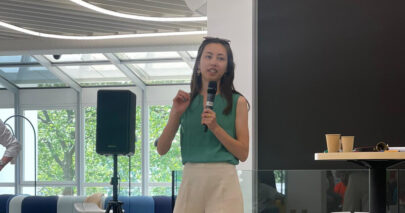
2020 has certainly been a challenging year for most people, industries and organizations. But there are silver linings and one is that technology-powered executive education programs are democratizing learning, making cutting-edge knowledge accessible to all staff — no matter what their position or profession.
Working in tandem with its clients, IMD is reinventing executive learning to deliver greater impact in a rapidly changing world. The same goes for the private sector; multinational corporations with staff based across the globe like PepsiCo and Hilti have navigated these profound shifts with grace and aplomb.
In a panel discussion entitled “The Future of Executive Learning is here” which took place on 20 October as part of the Business Insider Global Trends Festival virtual event, experts from academia and the private sector agreed that COVID-19 has transformed executive education overnight.
They also said the pandemic was providing real opportunities to strengthen the impact of this type of learning.
The road to reinvention
IMD, PepsiCo and Hilti had already begun the journey to online learning several years before the pandemic struck. However, from one day to the next, the three organizations were all obliged to shift everything to online learning, dramatically accelerating their previously planned digital transitions.
With employees working remotely and adjusting to new rhythms of life, deep thought was put into how to transform programs from face-to-face to engaging virtual experiences. It was the trigger point for restructuring educational programs across the board.
During the panel discussion, moderator Albrecht Enders, IMD Dean of Innovation and Programs, focused his questions on the new technologies brought onboard during the switch.
“COVID pushed learning in a new direction — the move to asynchronous meant shorter and more ongoing activities had to be developed,” answered Bettina Büchel, IMD Professor of Strategy and Organization.
“The ability to customize learning to the current needs of new work environments is necessary to deliver real learning and real impact regardless of mode.”
For Molly Nagler, Chief Learning Officer, PepsiCo, the rapid adoption of virtual education has been an unprecedented experiment demanding bigger investment in technology, training and content.
“We launched a learner experience platform that uses AI to drive and improve consumer-grade learning experiences with articles and videos, and we also pivoted our in-person programs to an online environment,” Nagler said.
Smaller multinational Hilti — with 30,000 global staff — also responded by integrating blended learning journeys. Recognizing the importance of face-to-face programming in its corporate culture, Hilti went full-speed on a new platform but aimed to keep in-person sessions when safely possible.
“In the future, we need to build in flexibility,” said Eivind Slaaen, Senior Vice President Human Resources at Hilti Corporation. ”In good times we can get together when it makes sense, and then if things go bad again and we cannot travel, we have the option to do it in a virtual way.”
Power to the people
Truly believing in the power of their people to learn and adapt is another element of the emerging paradigm, according to all three organizations’ assessment. It serves as a reminder that with proper support from their employers, employees can comfortably address their own professional and educational needs.
“Don’t worry about making learning mandatory,” stressed Slaaen, noting that in Hilti’s experience, people are seeking out learning on their own. “With our learning platform, people just access things themselves because their needs have skyrocketed.”
On this topic, Professor Büchel said: “Now is the time to create learning cycles that reinforce themselves over time. It is an opportunity with the openness of people to actually be online — once they have more choices available it might become more difficult to engage them.”
The priority must now be on staff feeling supported by having access to technology-enabled learning resources, and in turn democratizing education, the education experts said.
“Provide access to learning and see what happens – put the learner in the driver’s seat,” Nagler agreed.
Indeed, with work changing to be more project- rather than role-based, the panel stressed that agility and resilience are qualities that must be cultivated.


